Emergency HVAC Tarleton
Find the best After Hours HVAC in Tarleton
Get multiple 24/7 HVAC Repair quotes for your project today! Compare profiles, reviews, accreditations, portfolio, etc... and choose the best service.
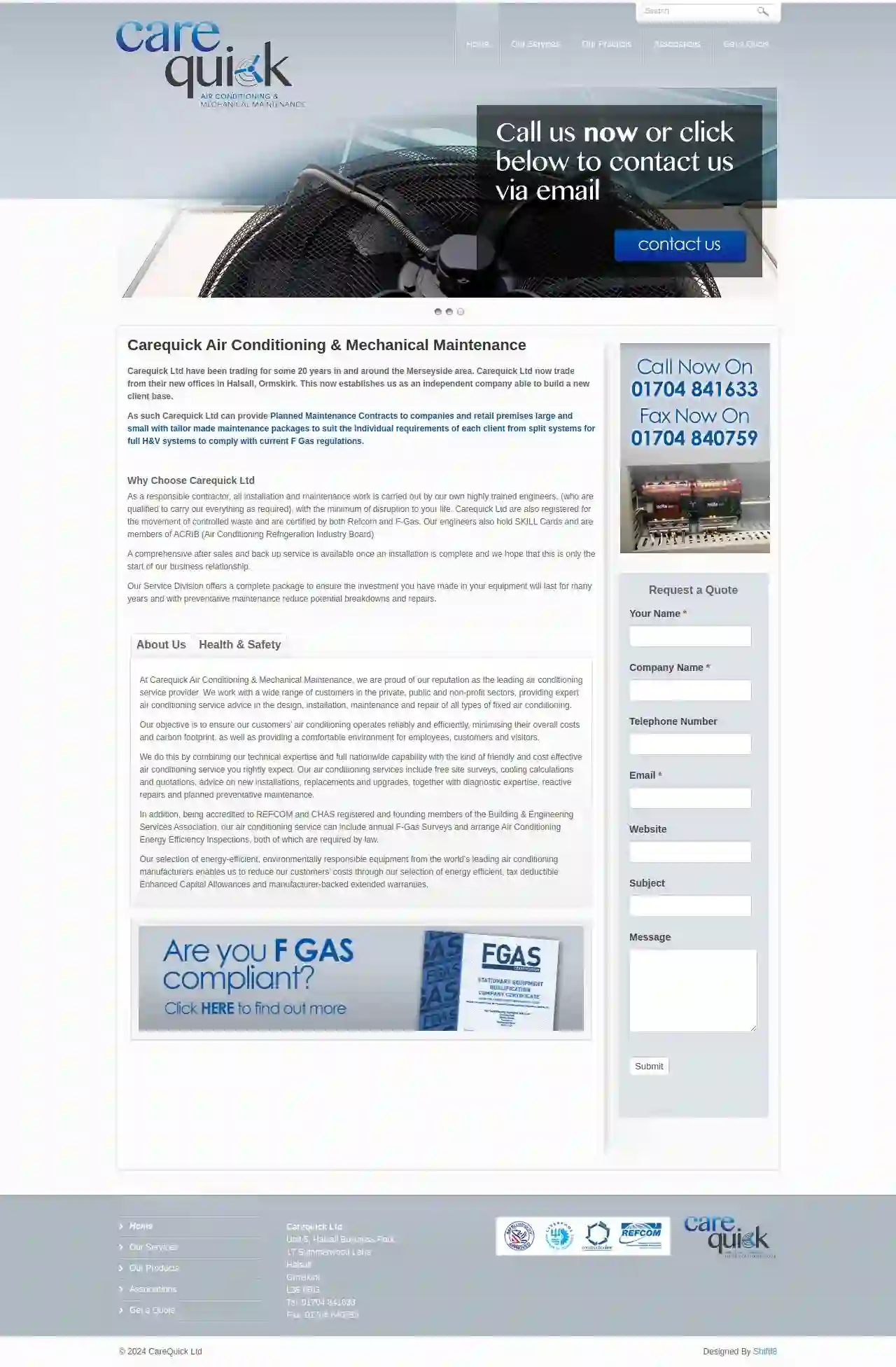
Carequick
32 reviews17 Summerwood Lane, Unit 5, Halsall Business Park, Halsall, L39 8RG, GBCarequick Ltd have been trading for some 20 years in and around the Merseyside area. Carequick Ltd now trade from their new offices in Halsall, Ormskirk. This now establishes us as an independent company able to build a new client base. As such Carequick Ltd can provide Planned Maintenance Contracts to companies and retail premises large and small with tailor made maintenance packages to suit the individual requirements of each client from split systems for full H&V systems to comply with current F Gas regulations. Our objective is to ensure our customers’ air conditioning operates reliably and efficiently, minimising their overall costs and carbon footprint, as well as providing a comfortable environment for employees, customers and visitors. We do this by combining our technical expertise and full nationwide capability with the kind of friendly and cost effective air conditioning service you rightly expect.
- Services
- Why Us?
- Accreditations
- Gallery
Get Quote
Express Preston Plumbing
Preston Road, Preston, DT3 6BJ, GBExpress Preston Plumbing specialise in all types of plumbing and heating services including burst pipe repairs, blocked drain cleaning, boiler repair and complete plumbing installations. We pride ourselves on our premier 24 hour emergency* plumbing and heating solutions. With locally based engineers covering all areas, we provide qualified local plumbers throughout Preston 24 hours a day, 365 days a year*. Our expert plumbers have developed a reputation for professionalism and quality workmanship. With no call-out charge or any hidden extras, let us help resolve your plumbing problem today. You only pay when you have signed to say you are satisfied with the works completed (deposit may be required for parts purchased).
- Services
- Why Us?
- Testimonials
- Gallery
Get Quote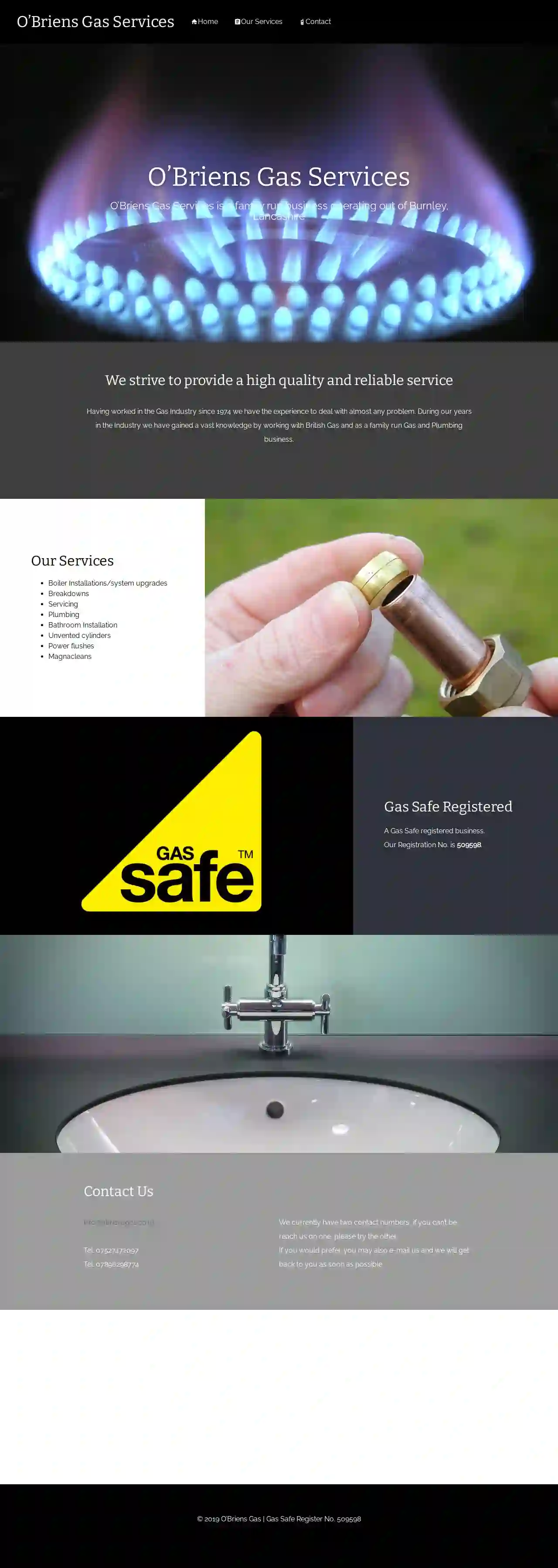
O'Briens Gas & Plumbing Services
51 reviewsBurnley, GBO’Briens Gas Services is a family run business operating out of Burnley, Lancashire. We strive to provide a high quality and reliable service. Having worked in the Gas Industry since 1974 we have the experience to deal with almost any problem. During our years in the Industry we have gained a vast knowledge by working with British Gas and as a family run Gas and Plumbing business.
- Services
- Why Us?
- Accreditations
- Gallery
Get Quote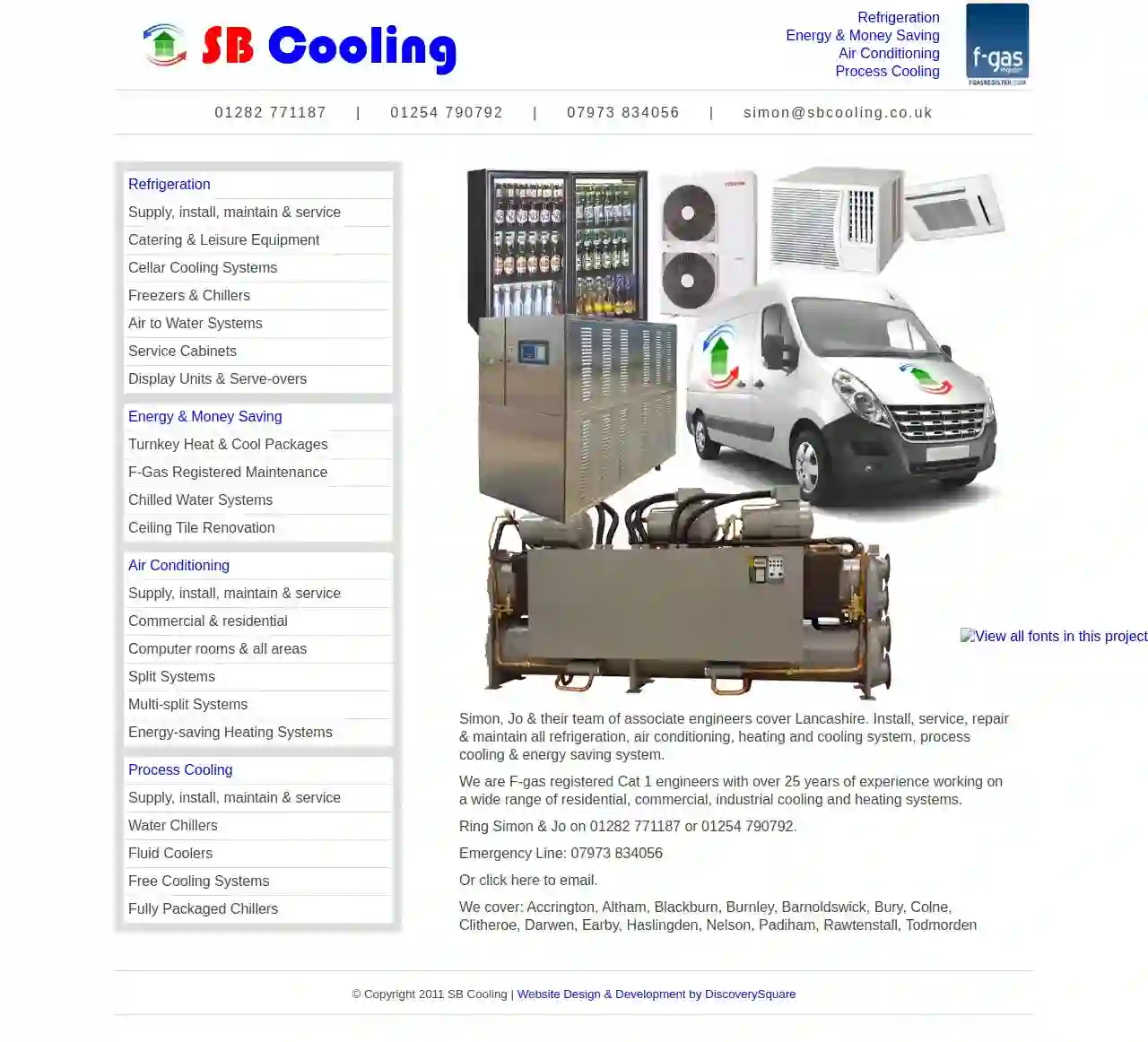
sbcooling-refrigeration & air conditioning
Burnley, GBSB Cooling is a refrigeration, air conditioning, and energy saving company based in Lancashire. With over 25 years of experience, we supply, install, maintain, and service a wide range of residential, commercial, and industrial cooling and heating systems. Our team of expert engineers is F-gas registered and caters to Accrington, Altham, Blackburn, Burnley, Barnoldswick, Bury, Colne, Clitheroe, Darwen, Earby, Haslingden, Nelson, Padiham, Rawtenstall, and Todmorden. We offer a range of services, including supply, installation, maintenance, breakdown, service, and repair of refrigeration, air conditioning, heating, and cooling systems. Our team is dedicated to providing energy-efficient solutions that save our customers money and reduce their carbon footprint.
- Services
- Why Us?
- Accreditations
- Our Team
- Gallery
Get Quote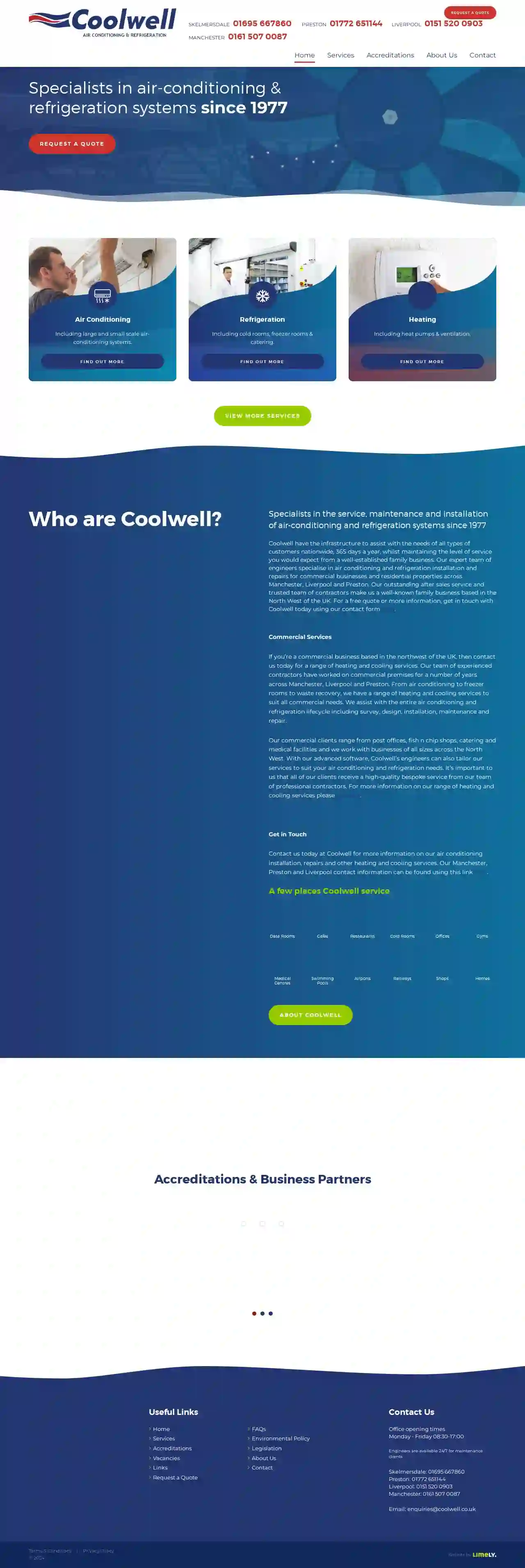
Coolwell
51 reviewsSkelmersdale, GBSpecialists in air-conditioning & refrigeration systems since 1977. Specialists in the service, maintenance and installation of air-conditioning and refrigeration systems since 1977 Coolwell have the infrastructure to assist with the needs of all types of customers nationwide, 365 days a year, whilst maintaining the level of service you would expect from a well-established family business. Our expert team of engineers specialise in air conditioning and refrigeration installation and repairs for commercial businesses and residential properties across Manchester, Liverpool and Preston. Our outstanding after sales service and trusted team of contractors make us a well-known family business based in the North West of the UK. For a free quote or more information, get in touch with Coolwell today using our contact form here.
- Services
- Why Us?
- Gallery
Get Quote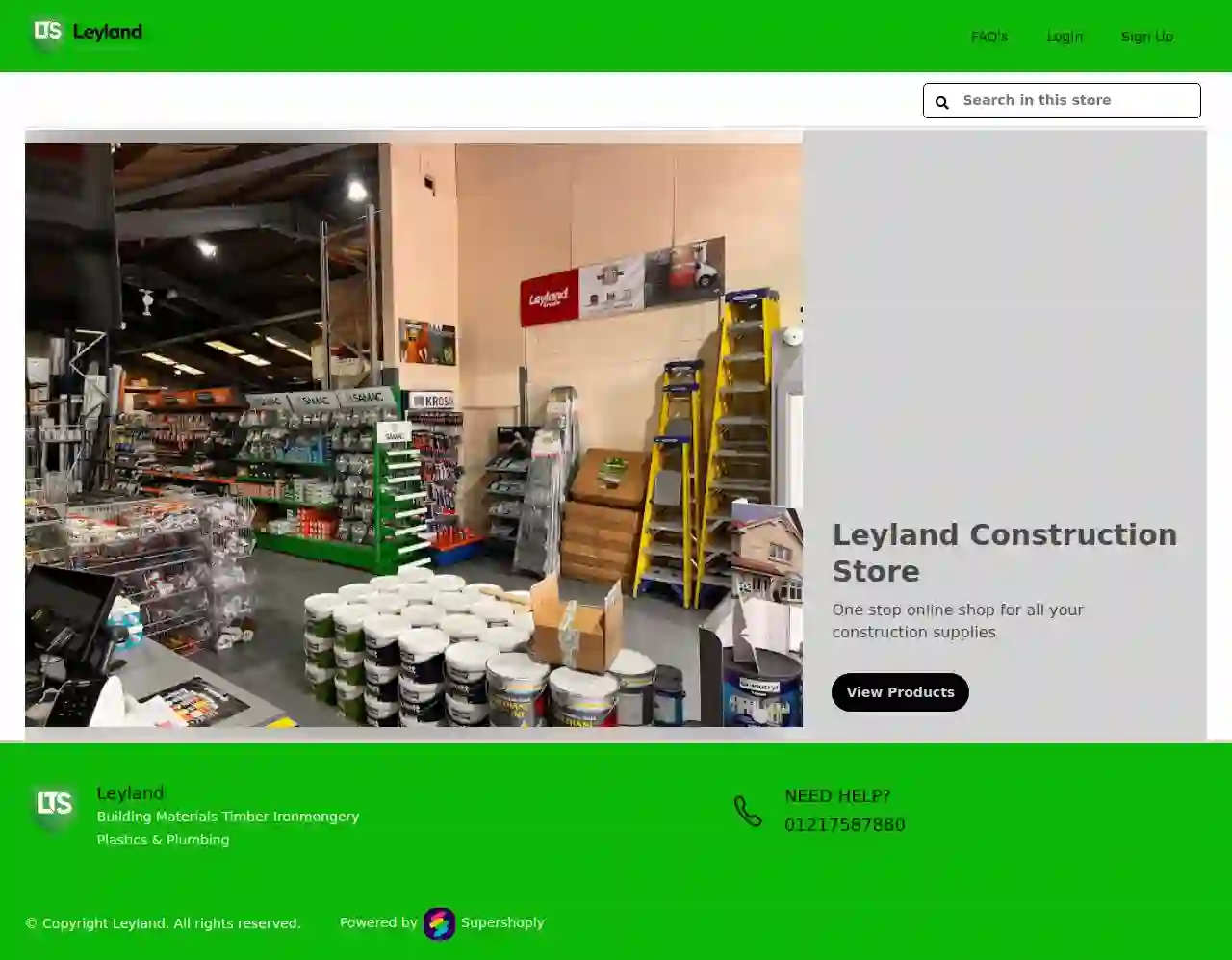
Leyland Trade Supplies
59 reviewsUnit 1 186a Drews Lane, Ward End, Birmingham, B8 2SL, GBLeyland Construction Store is your one-stop online shop for all your construction supplies. We offer a wide range of products, from building materials to timber, ironmongery, plastics, and plumbing. Our team of experts is here to help you find the perfect products for your project, whether you're a professional contractor or a DIY enthusiast.
- Services
- Why Us?
- Accreditations
- Gallery
Get Quote
Pure Air Conditioning & Refrigeration Ltd
53 reviewsChorley, GBWe are PureACR. We are two brothers with a dream to create a company that is Passionate, Unique, Reliable & Efficient, for a modern, ever-changing eco friendly world. We provide services for a range of different clients across the North West, each with their own unique air conditioning and commercial refrigeration requirements, in a variety of environments. Get in touch for a no obligation chat
- Services
- Why Us?
- Our Team
- Testimonials
- Gallery
Get Quote
Radical Heating Solutions Ltd
Unit 7, Chorley Central Business Park, Chorley, PR6 0BL, GBWith more than 35 years experience supporting installers, merchants, architects and developers both in the UK and internationally, Radical Heating Solutions Ltd are specialists in underfloor heating and heat pump systems, based in Chorley, Lancashire. We are so confident in our proposition that WE GUARANTEE TO BEAT ANY LIKE FOR LIKE QUOTATION for any underfloor heating system. We supply best in class products which are manufactured and designed to the highest technical standards and give technical support on the most relevant solution to fit every bespoke application
- Services
- Why Us?
- Gallery
Get Quote
STSUK.Com Ltd
57 reviewsAtherton, Manchester, Unit 4, Dorset Road Enterprise Centre, M46 9QU, GBSTSUK Ltd provides a fully integrated service covering the complete life cycle of Heating, Ventilation, Air-Conditioning, & Refrigeration equipment. Our clients are typically great businesses in the leisure, hospitality, medical, and retail sectors, or they are residential customers, all predominantly in the northwest of England, but we seem to end up everywhere! We ensure a fully integrated service that covers the complete life cycle of Heating Ventilation Air-Conditioning Refrigeration (HVACR) equipment. Our clients trust us to cater for their needs because they know we can get their equipment up and running quickly, efficiently, and economically. We work with clients in multiple sectors, including Commercial, Medical, Leisure & Hospitality, Residential, Retail, and Warehousing.
- Services
- Why Us?
- Gallery
Get Quote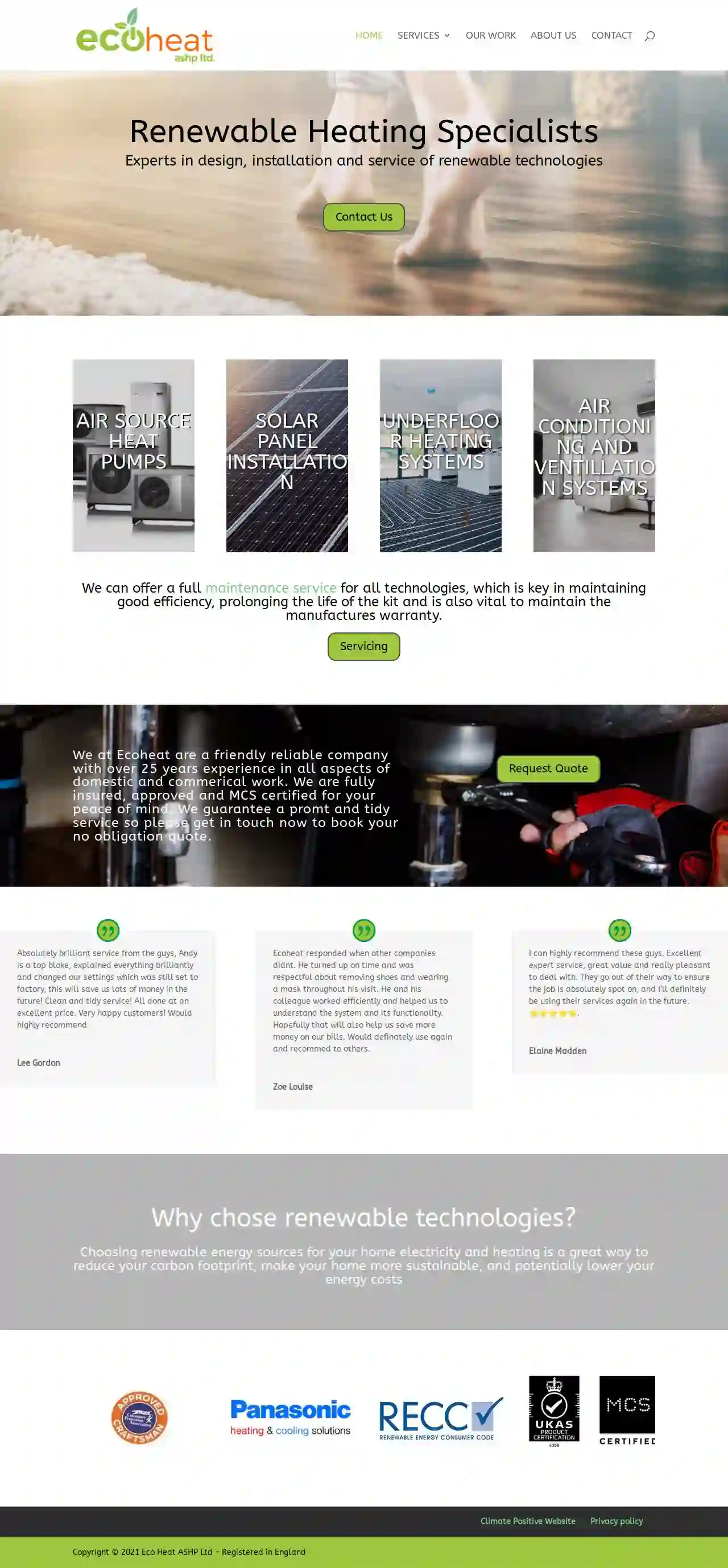
EcoHeat ASHP Ltd - Air Source Heat Pump, Installation and Servicing
4.69 reviews14 Briery Close, Preston, PR2 6XU, GBWelcome to Ecoheat ASHP Ltd, your trusted partner for renewable heating solutions. With over 25 years of experience in the industry, we specialize in the design, installation, and servicing of a wide range of renewable technologies, including air source heat pumps, ground source heat pumps, solar PV, solar thermal, air conditioning, ventilation, and refrigeration systems. Based in Preston, Lancashire, we serve both residential and commercial clients across the northwest. Our commitment to sustainability drives us to provide eco-friendly business practices wherever possible. We utilize a carbon-neutral digital services company and offset the carbon footprint of our website by planting trees and supporting world-leading climate crisis solutions. At Ecoheat, we prioritize creating cost-effective and efficient renewable solutions tailored to your specific heating and energy needs. We work closely with our customers to understand their requirements and deliver exceptional service that exceeds expectations.
- Services
- Why Us?
- Accreditations
- Our Team
- Testimonials
- Gallery
Get Quote
Over 12,692+ HVAC Companies on our platform
Our HVAC companies operate in Tarleton and surroundings!
HVACCompaniesHub has curated and vetted Top HVAC Businesses in Tarleton. Find a top & reliable pro today.
Frequently Asked Questions About Emergency HVAC Services
- Control Humidity: Keep indoor humidity levels between 30% and 50%.
- Regularly Change Air Filters: Change your air filters at least every three months.
- Clean Drip Pans and Condensate Drains: Regularly inspect and clean your AC unit's drip pans and condensate drains to prevent standing water.
- Ensure Proper Ventilation: Adequate ventilation helps to control humidity levels.
- Schedule Professional Duct Cleaning: Have your ducts professionally cleaned every few years to improve indoor air quality.
- Insulate Pipes: Insulate exposed pipes in unheated areas, such as crawl spaces, attics, and garages.
- Seal Air Leaks: Seal air leaks and cracks in walls and foundations near pipes.
- Keep Thermostat Consistent: Maintain a consistent thermostat setting, even when you are away, to keep indoor temperatures above freezing.
- Open Cabinet Doors: Open cabinet doors under sinks to allow warmer air to circulate around pipes.
- Let Faucets Drip: During extremely cold weather, allow cold water taps to drip slightly to relieve pressure and prevent pipes from bursting.
- Raise Your Thermostat: Set your thermostat to a higher temperature when you’re away. Consider using a programmable or smart thermostat.
- Use Fans: Fans can circulate air and make you feel cooler, even at a higher thermostat setting.
- Close Window Coverings: Keep curtains or blinds closed during the day to block out sunlight.
- Limit Heat-Generating Activities: Avoid running heat-producing appliances (ovens, dryers) during the hottest parts of the day.
- Annual AC Maintenance: Schedule yearly maintenance for your air conditioner to ensure it's running efficiently.
- Plant Shade Trees: Planting trees around your home can provide natural shade and reduce heat gain.
- Uneven Temperatures: Some rooms in your house might be significantly hotter or colder than others.
- High Energy Bills: An undersized or oversized system will be inefficient and increase your utility costs.
- Frequent Cycling: An oversized system will turn on and off more often than it should, reducing its lifespan.
- Poor Humidity Control: The system may not effectively control humidity levels, leading to discomfort or mold problems.
How can I prevent mold in my HVAC system?
How can I prevent frozen pipes in the winter?
How can I cool my home efficiently?
How can I tell if my HVAC system is the correct size for my home?
How can I prevent mold in my HVAC system?
- Control Humidity: Keep indoor humidity levels between 30% and 50%.
- Regularly Change Air Filters: Change your air filters at least every three months.
- Clean Drip Pans and Condensate Drains: Regularly inspect and clean your AC unit's drip pans and condensate drains to prevent standing water.
- Ensure Proper Ventilation: Adequate ventilation helps to reduce moisture buildup.
- Schedule Professional Duct Cleaning: Have your ducts professionally cleaned every few years to remove mold and other contaminants.
How can I prevent frozen pipes in the winter?
- Insulate Pipes: Insulate exposed pipes in unheated areas, such as crawl spaces, attics, and garages.
- Seal Air Leaks: Seal air leaks and cracks in walls and foundations near pipes.
- Keep Thermostat Consistent: Maintain a consistent thermostat setting, even when you are away, to keep indoor temperatures above freezing.
- Open Cabinet Doors: Open cabinet doors under sinks to allow warmer air to circulate around pipes.
- Let Faucets Drip: During freezing temperatures, allow faucets to drip slowly to relieve pressure and prevent pipes from bursting.
How can I cool my home efficiently?
- Raise Your Thermostat: Set your thermostat to a higher temperature when you’re away. Consider using a programmable or smart thermostat.
- Use Fans: Fans can circulate air and make you feel cooler, allowing you to raise the thermostat a few degrees.
- Close Window Coverings: Keep curtains or blinds closed during the day to block out sunlight.
- Limit Heat-Generating Activities: Avoid running heat-producing appliances (ovens, dryers) during the hottest parts of the day.
- Annual AC Maintenance: Schedule yearly maintenance for your air conditioner to ensure it's running efficiently.
- Plant Shade Trees: Planting trees around your home can provide natural shade and reduce heat gain.
How can I tell if my HVAC system is the correct size for my home?
- Uneven Temperatures: Some rooms in your house might be significantly hotter or colder than others.
- High Energy Bills: An undersized or oversized system will be inefficient and increase your utility costs.
- Frequent Cycling: An incorrectly sized AC unit will turn on and off too frequently, reducing its lifespan.
- Poor Humidity Control: The system may not effectively control humidity levels, leading to discomfort or mold problems.